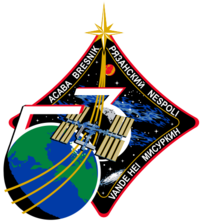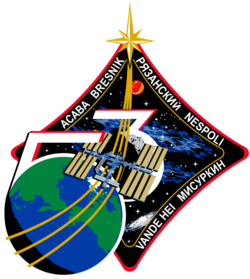Expedition 53
| Expedition 53 | |||
 | |||
| Uppdragsstatistik | |||
|---|---|---|---|
| Rymdstation: | ISS | ||
| Start: | 3 september 2017[1] | ||
| Slut: | 14 december 2017 | ||
| Antal besättningsmedlemmar: | 6 st | ||
| Rymdpromenad | |||
| Antal rymdpromenader: | 3 st | ||
| Total tid: | 20 h, 10 min | ||
| Transport | |||
| Uppskjutning: | med Sojuz MS-05, Sojuz MS-06 | ||
| Uppskjutningsplats: | Kosmodromen i Bajkonur | ||
| Landning: | med Sojuz MS-05, Sojuz MS-06 | ||
| Landningsplats: | Kazakstan | ||
| Kronologi | |||
| |||
Expedition 53 var den 53:e expeditionen till Internationella rymdstationen (ISS). Expeditionen började 3 september 2017 då delar av Expedition 52s besättning återvände till jorden med Sojuz MS-04.
Aleksandr Misurkin, Mark T. Vande Hei och Joseph M. Acaba anlände till stationen med Sojuz MS-06 den 13 september 2017.
Expeditionen avslutades den 14 december 2017, då Randolph Bresnik, Sergej Nikolajevitj Rjazanskij och Paolo Nespoli återvände till jorden med Sojuz MS-05.
Besättning
| Position | Första delen (3 - 13 september 2017) | Andra delen (13 september - 14 december 2017) |
|---|---|---|
| Befälhavare | Hans andra rymdfärd | |
| Flygingenjör 1 | Hans andra rymdfärd | |
| Flygingenjör 2 | Hans tredje rymdfärd | |
| Flygingenjör 3 | Hans andra rymdfärd | |
| Flygingenjör 4 | Hans första rymdfärd | |
| Flygingenjör 5 | Hans tredje rymdfärd | |
Bildgalleri
- Expedition 53 besättning.
- Vy mot jorden (Röda havet), fotograferad 8 september 2017 under Expedition 53.
Referenser
- ^ NASA's Space Station Expedition 53 Arkiverad 17 december 2019 hämtat från the Wayback Machine., läst 10 september 2017.
Externa länkar
| |||||||||||||||||||
Media som används på denna webbplats
The Expedition 54 crew insignia
- Orbiting Earth continuously since 1998, the International Space Station (ISS) is one of our greatest engineering achievements. It is depicted in gold, symbolic of constancy and excellence. Flying toward a sunrise represents the station’s contributions to a bright future. That sunrise uses blue, white, and red, the combined national colors of Japan, Russia, and the United States, symbolizing the crew’s cohesiveness. Crewmember names are in blue, symbolizing devotion and loyalty.
- The gold border represents the constant human presence in space onboard the orbiting laboratory. Symbolic of new Russian and U.S. spacecraft that will advance human exploration, the patch is shaped as a capsule. The number 54 is drawn as a path eventually leading to Mars.
- Finally, the stars symbolize the values of leadership, trust, teamwork, and excellence lived by mission control teams throughout the history of human space programs, as well as the global vigilance of those teams while operating the station.
The Expedition 53 crew insignia
- The International Space Station is our launch pad into the future of human space exploration. Collectively, our world stands at the cusp of incredible developments as a spacefaring species. Onboard the space station we continue to evolve the technologies vital to the sustainment and longevity of humans in the harsh realities of living without gravity or the protection of our atmosphere. These self-sustaining or regenerative technologies continually developed aboard the space station not only improve life here on Earth, but they are essential to human beings existence beyond low-Earth orbit (LEO).
- The space station is the linchpin for this next great phase of development and is instrumental in expanding the use of space, not only as a worldclass science laboratory, but also as a destination for next-generation space vehicles. This journey beyond LEO is depicted in the Expedition 53 patch as we, the crew, will endeavor to accomplish the work that allows future missions to further explore our solar system. This journey will only be accomplished as an international team, represented by our multinational crew as well as by the many countries depicted on the globe.
- The myriad of stars represent the untold number of passionate and supremely dedicated people that endeavor across the planet daily to make the space station the amazing vehicle it is as well as prepare us for the next great steps forward in space exploration.
View of Earth taken during ISS Expedition 53.
The Expedition 52 crew insignia
- Our planet is shown surrounded by an imaginary constellation shaped like a house, depicting the theme of the patch: “The Earth is our home.” It is our precious cradle, to be preserved for all future generations. The house of stars just touches the Moon, acknowledging the first steps we have already taken there, while Mars is not far away, just beyond the International Space Station, symbolized by the Roman numeral “LII,” signifying the expedition number.
- The planets Saturn and Jupiter, seen orbiting farther away, symbolize humanity’s exploration of deeper space, which will begin soon. A small Sputnik is seen circling the Earth on the same orbit with the ISS, bridging the beginning of our cosmic quest till now: Expedition 52 will launch in 2017, sixty years after that first satellite.
- Two groups of crew names signify the pair of Soyuz vehicles that will launch the astronauts of Expedition 52 to the Station.
The six-member Expedition 53 crew poses for an official crew portrait at the Johnson Space Center in Houston, Texas. Seated in the front (from left) are Flight Engineer Alexander Misurkin of Roscosmos and Commander Randy Bresnik of NASA. Standing in the back (from left) are NASA astronauts Joe Acaba and Mark Vande Hei, Sergey Ryazanskiy of Roscosmos and Paolo Nespoli of the European Space Agency.









